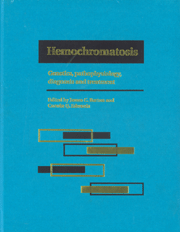Book contents
- Frontmatter
- Contents
- List of contributors
- Foreword
- Part I Introduction to hemochromatosis
- Part II Genetics of hemochromatosis
- Part III Metal absorption and metabolism in hemochromatosis
- Part IV Diagnostic techniques for iron overload
- Part V Complications of iron overload
- Part VI Therapy of hemochromatosis and iron overload
- Part VII Infections and immunity in hemochromatosis
- Part VIII Hemochromatosis heterozygotes
- Part IX Relationship of hemochromatosis to other disorders
- Part X Animal models of hemochromatosis and iron overload
- Part XI Screening for hemochromatosis
- Part XII Hemochromatosis: societal and ethical issues
- 52 Hemochromatosis: effect of iron fortification of foods
- 53 Evidence for population-based testing for hemochromatosis
- 54 Ethical issues and hemochromatosis
- 55 Hemochromatosis patients as blood and tissue donors
- 56 Genetic counseling for hemochromatosis
- Part XIII Final issues
- Index
54 - Ethical issues and hemochromatosis
from Part XII - Hemochromatosis: societal and ethical issues
Published online by Cambridge University Press: 05 August 2011
- Frontmatter
- Contents
- List of contributors
- Foreword
- Part I Introduction to hemochromatosis
- Part II Genetics of hemochromatosis
- Part III Metal absorption and metabolism in hemochromatosis
- Part IV Diagnostic techniques for iron overload
- Part V Complications of iron overload
- Part VI Therapy of hemochromatosis and iron overload
- Part VII Infections and immunity in hemochromatosis
- Part VIII Hemochromatosis heterozygotes
- Part IX Relationship of hemochromatosis to other disorders
- Part X Animal models of hemochromatosis and iron overload
- Part XI Screening for hemochromatosis
- Part XII Hemochromatosis: societal and ethical issues
- 52 Hemochromatosis: effect of iron fortification of foods
- 53 Evidence for population-based testing for hemochromatosis
- 54 Ethical issues and hemochromatosis
- 55 Hemochromatosis patients as blood and tissue donors
- 56 Genetic counseling for hemochromatosis
- Part XIII Final issues
- Index
Summary
Introduction
Hemochromatosis is the most common genetic disorder among Caucasians of Western European descent. Increasing recognition of its frequency and the recent development of a DNA-based genetic test have increased concerns about the methods used to diagnose and treat hemochromatosis at the level of individuals, families, and the general population, and the possible legal and ethical ramifications of widespread testing for and diagnosis of a heritable disorder. Therefore, we review the general legal rights of all patients, with attention to how they apply to the situation of patients with hemochromatosis and the special legal rights of some patients conferred by certain contracts. In addition, ethical rights, responsibilities, and unresolved questions are explored concerning hemochromatosis, including those of patients, physicians, and public policy.
Rights and responsibilities of patients
Privacy and confidentiality of medical information
Persons with hemochromatosis have moral and legal rights to privacy. The notion of a right conveys that respectful treatment is an entitlement, not a privilege or a benefit bestowed at the discretion of another. Each patient is entitled to be treated with dignity and in a way that avoids unnecessary exposure of the body or the disclosure of embarrassing information to others. The right to confidentiality is the right to control the communication of sensitive personal information, and the assurance that there will be no unnecessary communication of personal medical facts. However, the term ‘right’ does not necessarily convey the idea of a specific list of actions or omissions. Maintaining patient privacy and confidentiality varies with the individual and the situation, and there is no substitute for the physician's judgment and sensitivity in this regard.
- Type
- Chapter
- Information
- HemochromatosisGenetics, Pathophysiology, Diagnosis and Treatment, pp. 555 - 563Publisher: Cambridge University PressPrint publication year: 2000



